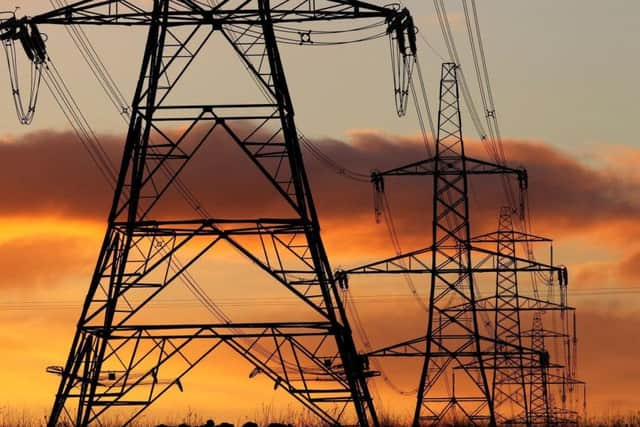What a no-deal Brexit would mean for Northern Ireland
and live on Freeview channel 276
Those closely observing what is going on to prepare for a such an eventuality distinguish between a pure no-deal scenario and a ‘no-deal plus’ situation whereby certain emergency agreements are struck in critical areas to ensure continuity of power supplies, hospital arrangements and other life-and-death scenarios.
The expectation is that even in the event of the UK not agreeing a deal with the EU there will at least be some such hastily agreed arrangements to prevent what would otherwise be an ominous situation not just for Northern Ireland, but for the Republic of Ireland as well.
Advertisement
Hide AdAdvertisement
Hide AdWhen asked about the possibility of a no-deal situation and how it would impact Northern Ireland, one senior figure involved in the Brexit process said: “There is good reason to be very concerned about this.”


Here are some of the key areas which will be impacted by the UK leaving the EU without a withdrawal agreement:
A hard border
While for about 20 years the Irish border has been largely invisible, in the event of no deal, there would be an EU obligation on the Republic of Ireland to put up a customs frontier to protect the EU market from sub-standard goods, while the UK would be obligated by the World Trade Organisation to erect its own border. Both the UK and Ireland insist they will not erect a hard border in any circumstances, but both sides would be under pressure to act.
However, the free movement of people – the most psychologically significant aspect of the Irish border – should be unaffected, given that the Common Travel Area between the UK and Ireland predates the EU and the EU has already agreed in principle to that continuing.
Advertisement
Hide AdAdvertisement
Hide AdIn June Joachim Pfeiffer, the economy spokesman for German Chancellor Angela Merkel’s Christian Democrats, warned that if there is no deal Ireland will be forced to have the “hardest border in Europe ... a border like we have a border with Ukraine or Belarus”.
Civil unrest
While few people expect anything like a return to the widespread bomb and gun attacks of the Troubles, a hard border will inflame nationalist sentiment, with the potential for civil unrest.
With devolution collapsed and politics having become more polarised than has been the case for more than a decade, there is a febrile political atmosphere and a widespread concern among nationalists about the direction of British government policy, which they see as cutting Northern Ireland off from the rest of the island after years of integration.
Electricity
A government contingency paper leaked to the Financial Times recently presented an apocalyptic outcome where the lights could go out in Northern Ireland if the all-island power network is halted by a no-deal Brexit.
Advertisement
Hide AdAdvertisement
Hide AdIt suggested that if the UK was no longer a member of the EU-wide electricity market there could be a thousands of electricity generators requisitioned and put on coastal barges.
However, given the expectation that even in a no-deal scenario there would be some basic emergency bilateral agreements put in place, the electricity situation is expected to be top of that list, given its significance for almost every aspect of life. Various sources played down the possibility of power blackouts, even under the most disordered form of Brexit.
Agriculture
Northern Ireland’s economy is more dependent on agriculture and food production than anywhere else in the UK.
It faces a double whammy in a no-deal scenario: Punitive WTO tariffs on exports and – for farmers close to the border – the added complication of moving livestock, feed or foodstuffs back and forth across a hard border.
Advertisement
Hide AdAdvertisement
Hide AdFor that reason, the Ulster Farmers’ Union had been happy at the softer Brexit emerging from the recent Cabinet meeting at Chequers but a no-deal scenario would be antithesis of what was on the table there.
Justice and security
During the Troubles the Northern Ireland justice system struggled to extradite terrorist suspects from the Republic, causing enormous political controversy.
Over recent years, that problem is largely non-existent, in part due to EU-wide agreements.
In a no-deal scenario, the UK would be outside the European Arrest Warrant, Europol and many other law enforcement or justice co-operation measures unless new arrangements could be put in place.
Advertisement
Hide AdAdvertisement
Hide AdPSNI chief constable George Hamilton has described the European Arrest Warrant as “particularly critical” to “ensuring that the border cannot be used by criminals to evade prosecution”, especially in relation to cooperation with the Garda.
Would there be any positives?
Northern Ireland businessman David Hoey, who headed up the Leave.eu campaign in Northern Ireland, argues that from the point of view of business a no-deal scenario, or “a clean Brexit”, would open Northern Ireland and the rest of the UK up to “more export markets more rapidly”.
He says that leaving without a deal “will at least bring clarity” for business, adding: “I’m not saying it’s instantly going to be wonderful but it does allow businesses to make decisions from a position of certainty – and the most important thing in business is to know where you stand.”